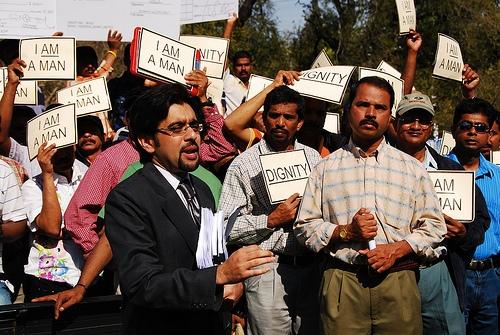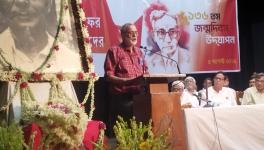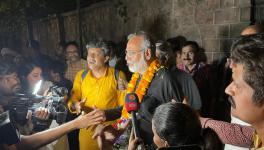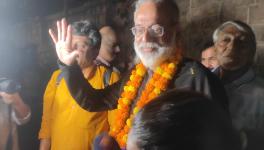India's Hands-off Approach to Migrant Workers' Rights
Newsclick discusses with Jennifer Rosenbaum, Legal Director of the National Guest Worker Alliance, USA, the issues of domestic workers in the background of the Devyani Khobragade case. Rosenbaum says there is an unfortunate lack of responsiveness on workers rights and human rights issues of workers. Even while there is a reasonable concern on the conduct of officials during the arrest of Ms. Khobragade, the situation of Ms. Sangeeta Richards, her working conditions, etc. have not received the needed concern.

Photo credit: Damien Ramos and Robert Caldwell for indymedia.org
Transcript:
Prabir Purkayastha (PP): Hello and welcome to Newsclick. Today we have with us Jennifer Rosenbaum also known as JJ who works with the Guestworkers Alliance in the United States. JJ good to have you with us.
Jennifer Rosenbaum (JJ): Good to be here. Thank you.
PP: The Devyani Khobragade case is currently of course front page news in India as you know. Now one part of the case has been discussed in detail in India. The fact that she was mistreated, that there is strip search, cavity search and so on which was not something which should have happened to a diplomat. That was the outrage which seems to have been in India and the fact that it was felt that if it was another country Russia, China or some other 'white' nation if you will, that this might not have happened but the other side of the picture has not really come out in too much detail which is that of the domestic worker. Now you deal with guest workers in the United States also the Indian guest workers, has the Government of India taken its position on when the guest workers are not treated well in the United States?
JJ: I think that's what's concerning in this case and other historical cases particularly the case of Signal International which involved five hundred welders and fitters from South India who were labour trafficked into the Mississippi and Texas states of the United States in the South and in this case of labour trafficking they tried very hard to engage with the Indian Officials in the US including going on a hunger strike in front of the Indian ambassador's office in order to get a meeting. In that case the Indian government was very hands off. It told the workers “we can't make demands on the United States, we can't intervene” and so I think what the Khobragade case and this case also shows is an unfortunate lack of responsiveness on workers' rights and human rights issues on the side of the workers. Even if there is a reasonable concern over the conduct during the arrest of Ms. Khobragade, the situation of Ms. Sangeeta Richards, the working conditions and also the threats against her family when she tried to bring those conditions forward, appears to have been very much off the radar in a concerning way.
PP: This is an interesting point that today the domestic workers' rights in the United States at least there is a much greater awareness about it and there is also a lot of organisations active on it. Do you think also the Government of India as well as the Indian Embassy in Washington misjudged the kind of reactions that they could get, particularly legal ones?
JJ: I think so and I think despite inaction by the Indian Government and in some cases the US Government on behalf of migrant workers, migrant workers themselves have been organising and raising their voices and winning important legal reforms in the United States. So in New York state where the Khobragade case occurred, the New York State Legislature passed a Bill of Rights for domestic workers and since then also California and Hawaii have passed similar state laws. There's a growing awareness with these state laws as well as with the recent ILO convention, that domestic workers are workers, that as migrant workers and workers they need protections under the law and they need workers' organisations. I think that this case shows that that understanding is really taking root and we're seeing migrant workers and guest workers taking the lead in the labour movement in many ways in the United States.
PP: So effectively the issue is that there are domestic workers in the employee of Indian foreign service officials and labour issues are there which need to be addressed. Of course it's rather surprising that the Government of India or the Indian External Affairs Ministry did not address what was building up to be a crisis and this should have spun out of control. Both from the US point of view as well as from the Indian point of view things should perhaps have been handled better. But getting outside the Khobragade case, because as you said there are really two different aspects to the case, you brought out the issue of five hundred workers who were... Could you give some more details?
JJ: Sure. So in 2007, right after Hurricane Katrina had devastated the United States' Southern Gulf Coast, a marine shipyard called Signal International, a pretty large corporation, recruited five hundred welders and pipe fitters from Kerala, Andhra Pradesh, Tamil Nadu and in India. The officials flew to India and conducted tests by US lawyers to help formalise the process and workers in India paid as much twenty thousand dollars US in what they thought would be to obtain a green card to live in the US permanently with their families. What they found instead was that they were coming on short term, temporary guest worker visas where their employment was tied to.. The visa immigration status was tied to their employment and when they arrived in the labour camps in Mississippi and Texas they were lugging thirty five people to one trailer, working in dangerous conditions, subject to racial discrimination at work based on their being Indian. When they tried to raise their voices against this treatment the company brought in private security and attempted to deport the workers who were leading the organising. Those workers, despite this incredible retaliation much like Ms. Richards' family, pursued in bringing forward these labour violations. They escaped the labour camps, they went on a satyagraha through the US south, studying the US Civil Rights Movement and ultimately went on a hunger strike in Washington DC to raise the profile of what had happened to them and to help more people in the United States understand about forced labour and the guest worker program and to understand that there's workers' rights issues generally but additionally workers who come on temporary visas that are tied to their employer have an additional layer of coercion in that visa program. So I think as we see with Ms. Richards, not only was she facing workplace violations that any domestic worker would face, but the fact that her visa was tied to her employment with Ms. Khobragade, the fact that Ms. Khobragade was holding her passport and she wasn't free to return home if she wanted and that she wasn't free to go and obtain another job that would pay commensurate with US law, left her in a very vulnerable position. Similarly with these welders and pipe fitters, they felt that they had no choice but to continue to live under constant surveillance and work in these dangerous conditions even when they faced aggressive retaliation. So I think in that situation there case helped educate US law makers, US policy makers and the public about what labour trafficking looks like and it has certainly impacted future cases including Ms. Richards' in this case. So what we see is while the Indian Government has taken a hands-off approach in these cases to the workers' rights issues, migrant workers themselves from India are building a scaffold of new understanding and support which each next worker is standing on.
PP: What happened finally to the five hundred workers?
JJ: So ultimately they were able to receive recognition as victims of human trafficking. They've settled in the United States, they've been able to bring their families and they are able to live and work in a dignified way, they're able to choose among employers that value the skills that they have, to live with their families and to continue to be engaged in immigration policy discussions in the United States about what kind of migration program is dignified and fair for workers who are offering important services to people living in the United States.
PP: So it has finally made a difference in the struggle but the Government of India's position was that they really had nothing to do with it and they were not going to take it up at all.
JJ: At the time the Government of India said very clearly to them that they could look into the events that occurred in India with the recruiter but they could make no demands on the United States.
PP: That brings me to the other issue. What was the role of the United States Government in this kind of cases?
JJ: I mean I think unfortunately there was not a labour trafficking prosecution in that case. The workers asked for it and continued to demand it. I think the US Government has been weak on bringing labour trafficking prosecutions against large corporations and so many of us in the United States are very much trying to ask those hard questions. What we also saw was that in that case the Immigration and Customs Enforcement was colluding with the employer to try to deport the workers before they could gain justice. Again, we think that the role of the Immigration and Customs Enforcement against migrant workers has blocked many important labour struggles. So I think many activists in the United States are very much in cooperation with activists around the world who think that the US Government should have a different policy in ensuring that migrant workers' rights are protected during the times when they are trying to expose labour struggles.
PP: So both sides were on two different sides on that part, on that case. In this case the US Government, at least the law enforcement agencies, are saying that we are fighting for the legal rights of the domestic worker but in that case where five hundred workers were involved against a corporation then the corporation obviously was much more powerful than a diplomat. So that seems to have been a different kind of case.
JJ: That's definitely a different kind of case. This also occurred in 2007 under the previous government and so it was under the Bush administration.
PP: This must be not only the question of Indian workers but obviously Mexican workers, workers from other parts an so on. So what kind of labour laws changes have take place subsequent to such struggles?
JJ: You know there was legislation introduced coming out of the Signal workers' fight which would protect the immigration status of workers who are engaged in serious labour disputes. So it would make sure that if you come on a guest worker visa, you're facing a labour violation, you can continue to remain in the United States and work for another employer while you pursue that justice. That legislation was introduced and has been included as part of the proposal for a broader immigration reform last year but the Immigration Reform Bill discussion is still caught up in the US Congress. It has not fully passed to the House yet.
PP: As of now there is really no legal protection to guest workers unless there are specific laws in states or there is a violation of the minimum wages. That's a different issue but if that doesn't happen, like the Signal's case that you were talking about, then there is really no redress. You're still tied to the employer completely.
JJ: I think that's what we see is that the labour laws that exist in the US still apply to many guest workers but the immigration status issue overrides the labour law in effect. So workers are reluctant to come forward even with really basic labour law violations if they are not going to be able to continue to work and pay back the recruitment debts that they incurred and continue to support their families. So it requires a much different kind of thinking about the immigration law in order to make sure that the labour laws that are on paper actually apply to workers on guest worker visas living in labour camps.
PP: That's an important point you're making because a lot of the people who go over as guest workers also incur large debts and for them to lose the employment and come back means there's no way to really beat those debts.
JJ: No way to pay those debts in home currency, definitely. That's another area of advocacy to try to say that employers who want to bring workers should have to incur the costs and they should not be passed on to workers because when you have that debt, again it makes it very difficult.
PP: So two issues, one is the debt that they incur (A) and (B) is the fact that the employment is completely tied to the employer. So that if they lose an employment they have to go back and face the debt. That really combines to make this very difficult for them to fight their employers.
JJ: That's right and I think the third issue is that when you see these recruitment chains that stretch trans-nationally, there's also the ability to bring coercion or retaliation outside of the specific workplace and against workers' families. So we regularly see that if a worker brings forward a workplace complaint the employer will threaten. Not only that will he fire the worker and deport him into debt but also that he will threaten the workers' families. We saw that in the Signal case. The recruiter from India, Sachin Dewan, actually flew to the United States to make threats against workers. Threats that if they continue to raise their voices and make trouble for the company, there would be consequences in India. We also have seen that with cases with workers from Mexico and other countries.
PP: What was the bulk of the guest workers in the United States coming from?
JJ: Mexico has the most because of the geographic proximity but we also see guest workers from South Asia, we see guest workers from East Asia, China and as well as from Latin America. In some cases we have seen employers shopping around for guest workers from the furthest location who speak languages that are hardest to find advocates who can speak and who will pay the highest amounts of fee. So we saw the reach to recruit welders not just from Mexico but also from India, ultimately from Brazil. As soon as the advocates and the activists catch up, the employers will try to shift to another country where the workers are even more inaccessible.
Prabir: So essentially the idea is to isolate them as far as possible within the United States so that they don't really know what their rights are or can't fight for them. Would that be the interpretation of what they're doing?
JJ: I would say so and to really try to find the most exploitable workforce and the recruiters help with that. What recruiters do is make sure people are as indebted as possible and make sure that they can add an extra layer of coercion and really try to supply a captive workforce to employers and employers become addicted to those kinds of workers who are living without their family, who feel pressure to work under any conditions, under any schedule, living in a labour camp. It's quite a cost effective labour force if you think about it that way.
PP: This should be a very important issue partly because now with the kind of things that are happening in Qatar for instance where there's a major sports event, it's said that large part of that is going to be built with Indian labour and not very, if any, dissimilar conditions to what you're describing, perhaps worse. Thank you very much and I think this is something that should interest the Indian people; not only the indignity to the diplomats but also what happens to our workers who go and work elsewhere. Thank you very much.
JJ: Thank you so much.
Get the latest reports & analysis with people's perspective on Protests, movements & deep analytical videos, discussions of the current affairs in your Telegram app. Subscribe to NewsClick's Telegram channel & get Real-Time updates on stories, as they get published on our website.























